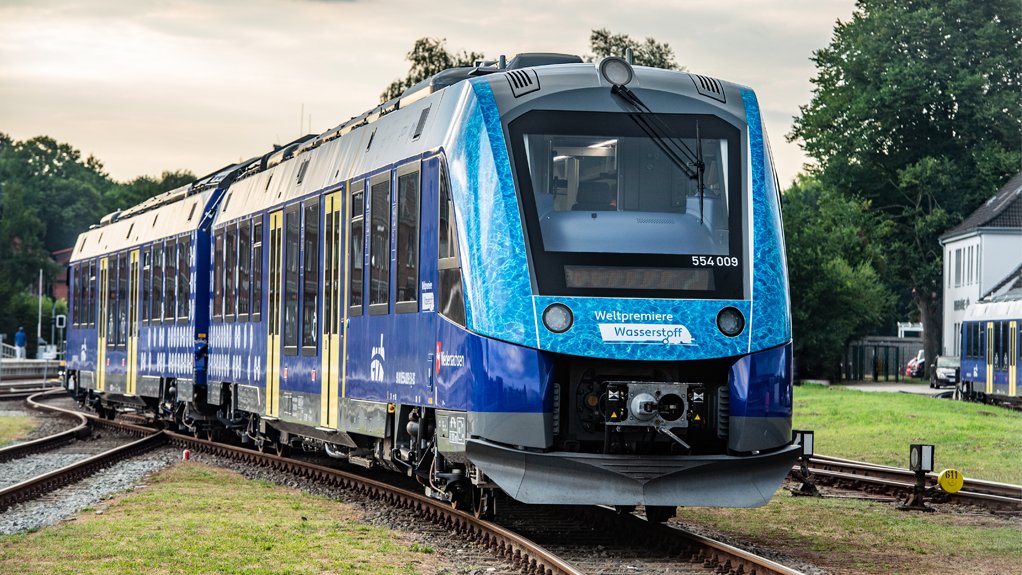Alstom accelerates hydrogen train development with key roll-out in Europe
Having spent about six years developing a range of hydrogen fuel cell-powered trains, mobility solutions provider Alstom is accelerating its refinement and roll-out of the zero-harmful-emissions trains, especially in Europe, where diesel trains are still pervasive on low-density lines.
Across the European Union, the company points out, 46% of railway is not electrified, thereby creating an entry point for an alternative to diesel traction, but with better emissions control, to enter the market.
Despite numerous electrification projects in several countries, Alstom reports that a significant part of Europe’s rail network will remain non-electrified over the long term.
In many countries, the number of diesel trains in circulation is still high, with more than 4 000 cars in Germany, for instance, the company points out.
Alstom started its hydrogen-powered train journey in 2016 with the unveiling of its Coradia iLint model at the InnoTrans trade show, in Berlin.
The company’s hydrogen-powered trains offer a “true alternative” to diesel trains, as they are capable of similar ranges between refuelling and similar refuelling methods and timelines – meaning that hydrogen trains can run similar timetables to diesel counterparts.
Speaking at the Smarter Mobility Africa Summit, in Johannesburg, this week, Alstom Southern Africa MD Bernard Peille said the company was aiming to help train operators phase out diesel-powered trains with more environment-friendly alternatives, with a goal of completely phasing-out diesel-powered traction by 2040.
Transport-related emissions are a critical problem to address because as much as 27% of the globe’s emissions originate from transport activities, states Alstom.
In this regard, the company posits that its Coradia iLint uses the existing rail infrastructure without the need to invest in electrification or other modifications or retrofitting of new systems, thereby serving as a simple replacement to diesel trains. This, the company says, is important for low-density rail lines.
Alstom recently conducted a successful test run of its Coradia iLint train over 1 175 km without refuelling. On average, Alston hydrogen trains have a range of 1 000 km and a top speed of 140 km/h.
The company’s battery-powered trains have a range of about 120 km, while kinetic energy can also be harvested during braking, thereby recharging batteries and extending the range.
As for rolling out hydrogen and battery trains, Alstom has received orders over the past three years from major clients in Germany, France and Italy.
“It has been a long ride,” Peille says of Alstom’s hydrogen- and battery-powered train development.
“We started to [operate hydrogen trains] in Germany in 2020 with the first test [runs undertaken]. Then we concluded, earlier this year, the first fleet of [hydrogen] trains put in service, transporting passengers every day in the northern part of Germany,” he adds.
In August, Alstom also started operating its Coradia iLint fully-hydrogen-powered train in Bremervörde, Lower Saxony, Germany – the application being the first time a hydrogen train has entered commercial service, as well as being the first train route to use 100% hydrogen energy.
This 14-vehicle fleet,capable of being operated on the line all day long with refuelling, belongs to Landesnahverkehrsgesellschaft Niedersachsen and replaces a legacy 15-vehicle diesel fleet.
Despite Alstom’s efforts to develop green train solution alternatives being “a long journey”, Peille says another long development and introduction journey awaits the company because many customers have placed orders for hydrogen trains, especially in Europe.
“They [the train operators] want to move [to greener methods of operating] and they want this transition to hydrogen,” he says.
In particular, Peille says Italy has taken a keen interest in introducing hydrogen trains, with plans to add hydrogen models next year. He also says many other European countries are showing a growing interest in acquiring hydrogen trains in the years ahead.
Meanwhile, the company has set a target to achieve a 25% reduction in the energy consumption of its solutions by 2025, against 2014 as the benchmark year. As of March this year, Alstom had already achieved a reduction of 22%.
Comments
Press Office
Announcements
What's On
Subscribe to improve your user experience...
Option 1 (equivalent of R125 a month):
Receive a weekly copy of Creamer Media's Engineering News & Mining Weekly magazine
(print copy for those in South Africa and e-magazine for those outside of South Africa)
Receive daily email newsletters
Access to full search results
Access archive of magazine back copies
Access to Projects in Progress
Access to ONE Research Report of your choice in PDF format
Option 2 (equivalent of R375 a month):
All benefits from Option 1
PLUS
Access to Creamer Media's Research Channel Africa for ALL Research Reports, in PDF format, on various industrial and mining sectors
including Electricity; Water; Energy Transition; Hydrogen; Roads, Rail and Ports; Coal; Gold; Platinum; Battery Metals; etc.
Already a subscriber?
Forgotten your password?
Receive weekly copy of Creamer Media's Engineering News & Mining Weekly magazine (print copy for those in South Africa and e-magazine for those outside of South Africa)
➕
Recieve daily email newsletters
➕
Access to full search results
➕
Access archive of magazine back copies
➕
Access to Projects in Progress
➕
Access to ONE Research Report of your choice in PDF format
RESEARCH CHANNEL AFRICA
R4500 (equivalent of R375 a month)
SUBSCRIBEAll benefits from Option 1
➕
Access to Creamer Media's Research Channel Africa for ALL Research Reports on various industrial and mining sectors, in PDF format, including on:
Electricity
➕
Water
➕
Energy Transition
➕
Hydrogen
➕
Roads, Rail and Ports
➕
Coal
➕
Gold
➕
Platinum
➕
Battery Metals
➕
etc.
Receive all benefits from Option 1 or Option 2 delivered to numerous people at your company
➕
Multiple User names and Passwords for simultaneous log-ins
➕
Intranet integration access to all in your organisation



















